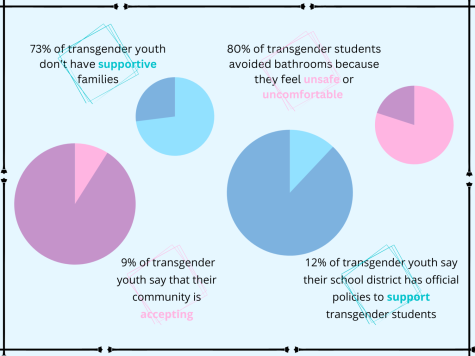Reaffirming transgender rights
Nov 9, 2022
This previously ran in our October 2022 print issue.
On Aug. 8, the East Penn School District introduced an amendment to the “student rights” portion of the Code of Conduct. The changes were made to protect transgender students’ rights, including the right to privacy and the right to use their preferred names and pronouns.
One of the several amendments is “be[ing] included in the group that corresponds to their gender identity” and gives students the right to use restrooms that correspond to their gender identity. These measures are part of a larger movement across the country to protect the rights of transgender people.
At the same time, many states have been enacting legislation to undermine the rights of transgender students. In Arizona, a bill from March 2022 declared that students could only play for the sports team of their sex assigned at birth. A similar act was also proposed to the Missouri bill last month.
In addition to prohibiting transgender students from participating with the team whose gender they identify with, the Arizona bill, called HB 2068, also banned the “teaching of divisive concepts.” In today’s divided and polarized world, this implies that the teaching of LGBTQ+ issues may soon be suppressed.
This is similar to what happened in Florida earlier this year, with the “Don’t Say Gay” bill. This bill, passed in March 2022, forbids “classroom discussion about sexual orientation or gender identity.”
According to Professor Clay Calvert of the University of Florida, some interpretations of the bill could forbid teaching about the AIDS epidemic and the history of same-sex marriage. Given the bill’s vague wording in some places, “teachers may legitimately fear being sued,” Calvert said. Legislation like this, which restricts the teaching of sexuality and gender, is contributing to nationwide transphobia.
As parts of the nation shifts more to the right, these bills are becoming concerningly common. Similar legislation has been proposed in at least 22 states since 2021. It truly is alarming how easily these bills are proposed, one after another, targeting transgender youth and their way of life.
Even in Pennsylvania, transphobic bills are working their way into our legislature. This past summer, Gov. Wolf vetoed a bill similar to the ones in Arizona and Missouri. As an ardent Democrat, he has stood with his party in defense of LGBTQ+ rights. The bill aimed to establish all sports teams in public schools as expressly designated male, female, or co-ed.
As midterm election for Pennsylvania governor approaches, voters must make a decision between Democrat Joe Shapiro and Republican Doug Mastriano; LGBTQ+ issues have become a hot-button topic. Mastriano and Shapiro have expressed sharply different views regarding the protection of LGBTQ+ rights – Shapiro is an ardent supporter of all LGBTQ+ rights and supports same-sex marriage licenses.
Meanwhile, Mastriano has attempted to suppress education on gender identity and sexual orientation in elementary schools. He supported a now-dead bill to stop gender identity education in June 2022. In 2018, when asked whether same-sex marriage should be legal, he said, “absolutely not.” He added that traditional marriage was “the first institution founded by God in [the book] Genesis, and it needs to stay that way.”
That kind of homophobic stance is a threat to LGBTQ+ students everywhere. By reaffirming their rights, East Penn has stood up to transphobia and embraced a more inclusive environment necessary for all students.
It is crucial that we as students, teachers, and administrators show support for transgender and non-binary students, not just to create a safe environment and make LGBTQ+ students feel welcome in the school, but to stand up to help make this world a better, more inclusive place. We will never hate another person simply because a politician told us they are “unnatural,” because that simply isn’t true. Everyone is equal, and no one can take that away. Ever.
The Editorial Board votes 10-0 in support of East Penn’s changes to the Code of Conduct in regards to transgender students’ rights.












